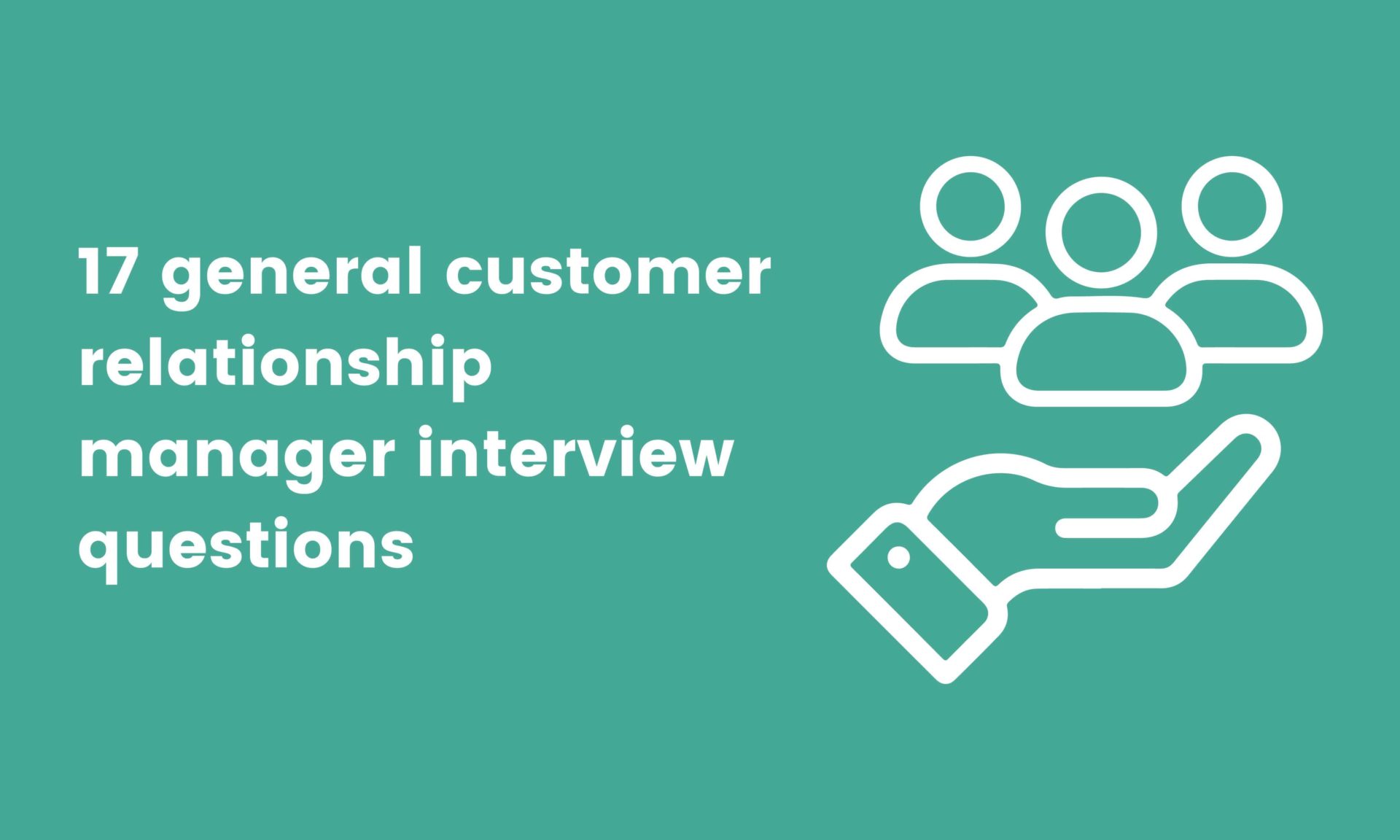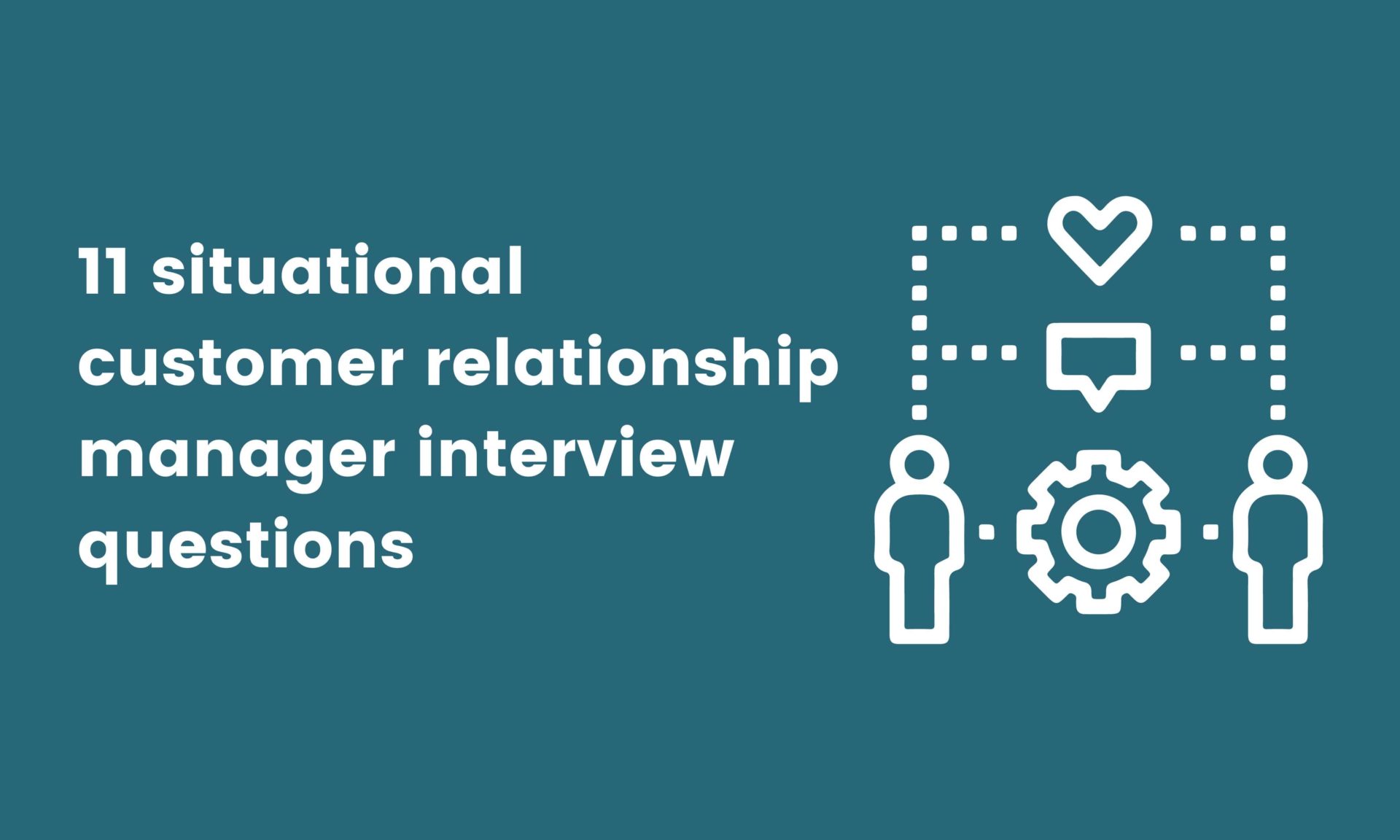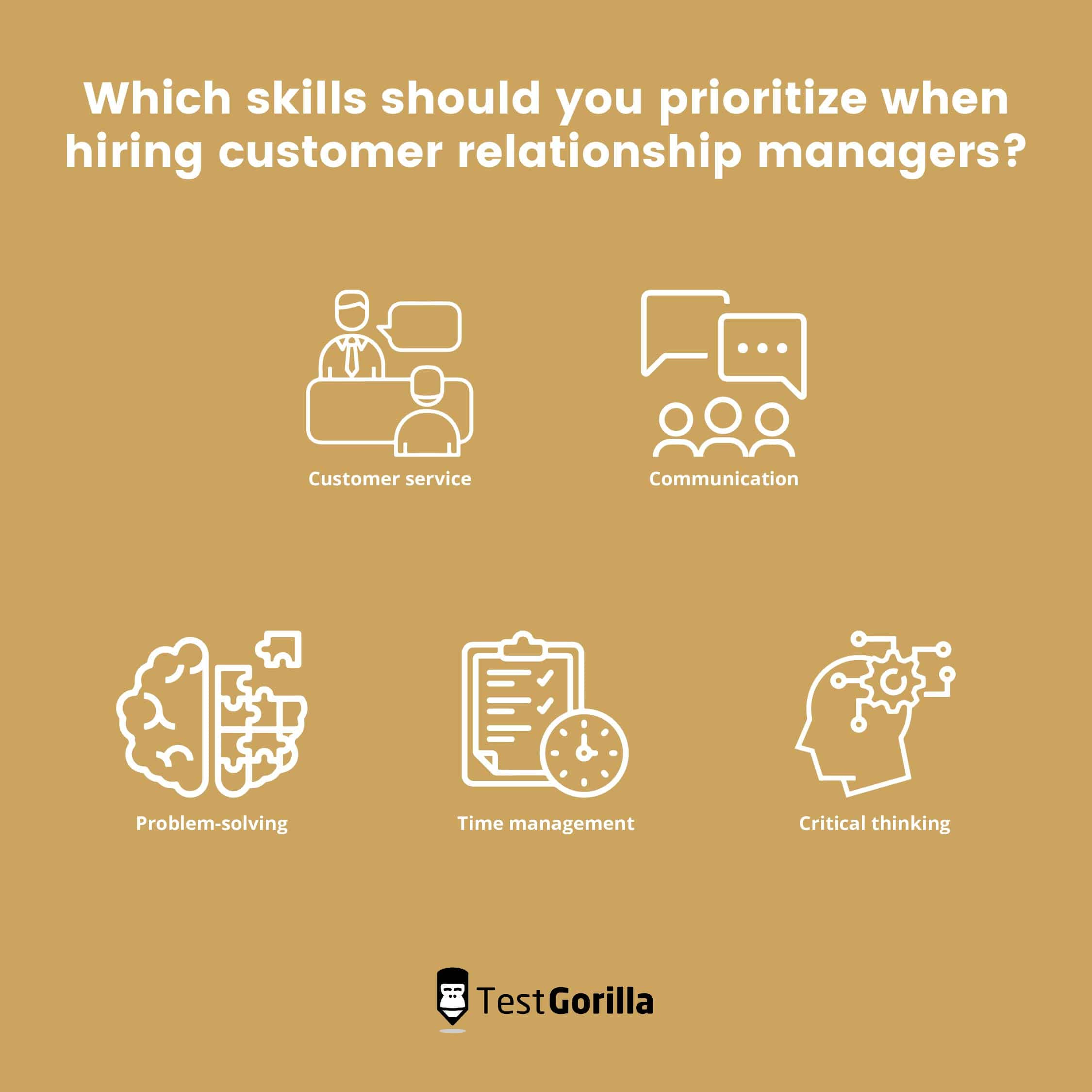45 customer relationship manager interview questions to ask applicants
What’s the best way to keep customers happy and increase retention rates? It’s a challenging objective – one which may require a skilled customer relationship manager.
Hiring a customer-relationship manager (also known as CRM manager) with the right customer success skills, soft skills, and CRM platform knowledge (examples include Hubspot CRM or Salesforce CRM) is critical and can help you increase customer loyalty.
To simplify the hiring process, we advise you to use skills assessments and customer relationship manager interview questions: This way, you’ll get an accurate idea of each candidate’s qualities and strengths.
If you’re currently preparing the questions you’d like to ask candidates in an interview, you’re at the right place: This article features a comprehensive list of 45 customer relationship manager interview questions you can use.
Table of contents
- 17 general customer relationship manager interview questions
- 5 general customer relationship manager interview questions and answers
- 15 customer relationship manager interview questions related to definitions
- 5 customer relationship manager interview questions and answers related to definitions
- 11 situational customer relationship manager interview questions
- 5 situational customer relationship manager interview questions and answers
- Which skills should you prioritize when hiring customer relationship managers?
- When should you use skills tests during the hiring process?
- Hire the best applicant using customer relationship manager interview questions
17 general customer relationship manager interview questions
Consider these 17 general customer relationship manager interview questions when building your list of opening questions.
Use these at the beginning of the interview to get to know your candidates better and to help them feel more at ease.
Explain what CRM means.
Describe yourself in three words.
What do you hope to have achieved in five years?
Describe your customer-relationship-management experience.
Which skills do customer-relationship managers require?
Name three soft skills that customer-relationship managers require.
Describe the biggest challenge in your previous role. How did you handle it?
What motivates you to achieve success in a customer relationship manager role?
Describe a time you failed to achieve customer success. What did you improve and learn from the experience?
Describe your most outstanding achievement in your current customer relationship manager role.
Name three elements of good customer service.
Have you used any software tools to help build and manage customer relationships?
How do you stay up to date with changes in customer-relationship management?
What are the advantages of incorporating a CRM system in customer operations?
What are some critical challenges for customer-relationship managers?
What are some challenges related to CRM system incorporation?
Name some handy CRM tools’ features for managing customer emails.
5 general customer relationship manager interview questions and answers
Check the list below for five general customer relationship interview questions and answers, which will guide you when interviewing applicants and allow you to assess their skills easily.
1. Have you used any software tools to help build and manage customer relationships?
Experienced customer relationship managers should have experience with customer relationship management systems (CRMs) such as Hubspot CRM to track unmet customer requirements and better serve clients.
Applicants may explain that they have used CRMs to build and streamline the customer-relationship-management process since these systems help managers anticipate issues before they occur.
2. Describe a time you failed to achieve customer success. What did you improve and learn from the experience?
No matter which example your applicants give when responding to this interview question, always find out whether they learned and improved.
For instance, if a customer repeatedly complained about a service and decided to go to a competitor instead, consider whether your applicant understood that enhancing the customer experience should always be a priority.
3. Which skills do customer-relationship managers require?
Applicants should be aware that negotiation and customer success skills are vital for customer-relationship managers. They may also mention that knowledge of CRM systems is essential.
4. Name three soft skills that customer-relationship managers need.
Here are three fundamental soft skills that customer relationship managers need:
Excellent communication skills: Does your applicant recognize that speaking with customers is an essential part of the job of a CRM manager? Do they understand that active listening is a vital communication sub-skill to improve communication?
Critical-thinking skills: Do your applicants know that enhancing the customer experience requires top critical-thinking skills to seamlessly put solutions into action?
Problem-solving skills: Are your applicants talented problem-solvers, and do they understand how problem-solving skills can help increase customer loyalty and retention?
5. Name some handy CRM tools’ features for managing customer emails.
Candidates familiar with CRM systems should know their best customer email management features, including email automation, template management, data analytics, and customer-email customization options.
The best insights on HR and recruitment, delivered to your inbox.
Biweekly updates. No spam. Unsubscribe any time.
15 customer relationship manager interview questions related to definitions
Get inspiration for your list of questions with the 15 customer relationship manager interview questions related to definitions below.
What is a strategic CRM system?
What is an operational CRM system?
What is an analytical CRM system?
What is a collaborative CRM system?
Explain what marketing automation is.
Name the critical objectives of customer-relationship management.
Explain what customer self-service is.
Explain what it means to empower your customers.
Explain what a customer lifecycle is.
Outline what customer acquisition is.
Outline what customer conversion rate is.
Outline what customer retention is.
Outline what lead qualification is.
What is the difference between customer acquisition and customer retention?
Outline what a situation analysis is.
5 customer relationship manager interview questions and answers related to definitions
Check the five customer relationship manager interview questions and answers listed below. They’ll help you evaluate your candidates’ responses.
1. What is the difference between customer acquisition and customer retention?
Customer acquisition and customer retention are two CRM strategies targeted at two different groups of customers:
Customer acquisition aims to get more new customers or customers who have never made a purchase before
Customer retention aims to retain customers and improve customer loyalty so that customers remain satisfied with the services or products offered and make new purchases regularly
2. Name the critical objectives of customer-relationship management.
Several key customer-relationship-management objectives your applicants may mention when responding to this question include:
Enhancing customer satisfaction: Improving customer satisfaction leads to increased customer loyalty, better business reputation, and more sales. Applicants may explain that they would enhance customer engagement through improving customer service, increasing the frequency of check-ins with customers, or investing in building a better user experience.
Building a customer base: This involves attracting prospective customers who haven’t yet converted and building relationships with them. The bigger and more engaged the customer base, the more sales the business can make.
Increasing sales: Increasing sales involves using strategies to negotiate deals and close sales more efficiently. It also might mean improving product offerings, creating bundles, or using promotions strategically to sell more.
3. Explain what customer conversion rate is.
Can your applicants explain that customer conversion rate is the percentage of prospects or potential customers who complete a given desired action? For example, in retail, customer conversion rates may be related to the number of potential customers who make a purchase compared to those who don’t. For a SaaS platform, it can be the percentage of leads that purchase a subscription.
4. Outline what customer retention is.
Are your applicants aware that customer retention reflects the loyalty of a business’ customers?
Can they explain that higher customer retention rates are achieved when a company succeeds in keeping their customers, for example with the right strategies for improving customer engagement and satisfaction?
5. Outline what customer acquisition is.
Can your applicants explain that customer acquisition means attracting and converting new customers? Are they aware that influencing and persuading target customers is a critical step for successful customer acquisition?
11 situational customer relationship manager interview questions
Use some of the 11 situational customer relationship manager interview questions below to evaluate applicants’ situational-judgment capacities.
Tell me about a time you had to say “no” to a customer.
Have you ever gone out of your way to enhance the customer experience?
You have a customer who makes a complaint. How do you resolve the issue?
Have you ever had to handle a customer who was being unreasonable? Which strategy did you use?
You encounter a customer who has a complex set of requirements. How do you meet their needs?
A customer has a requirement that you have never encountered before. How do you resolve the situation?
Which engagement techniques would you foster to manage customer relationships?
A customer wants to stop using your company’s services. How would you try to retain them?
When do you think a business should start using a CRM software tool such as Salesforce CRM?
Which strategy would you use to learn about your competitors?
You are tasked with expanding our customer base. How would you achieve this?
You are asked to communicate with a customer offline. Which approaches would you use to build a strong customer relationship with them?
How would you help us improve our conversion rates?
5 situational customer relationship manager interview questions and answers
Check out our sample answers to five of the situational customer relationship manager interview questions from the previous section. You can use them to evaluate your applicants’ responses.
1. Tell me about a time you had to say “no” to a customer.
Customer relationship managers must say “no” to customers from time to time. Your applicants should have the right problem-solving skills to offer alternative options to customers in these situations.
For instance, if a customer demands a substantial discount that is unsustainable to a business, applicants must be able to say “no” and offer alternative solutions.
2. Have you ever gone out of your way to enhance the customer experience?
Since customer loyalty is a top priority for customer-relationship managers, ensure your candidates can prove they can go out of their way to enhance the customer experience.
For example, to increase the customer experience and loyalty, candidates may actively seek customer feedback or use customer rewards.
3. Have you ever had to handle a customer who was being unreasonable? Which strategy did you use?
Be wary of customer relationship managers who complain about customers and cannot provide solutions to scenarios like these. Your applicants should know how to work towards understanding customers’ complaints and be able to determine whether the right information was provided to them during previous interactions.
CRM managers may seek to meet customer needs by ensuring they provide the right information to customers and then focusing on solving specific problems.
4. You are tasked with expanding our customer base. How would you achieve this?
There are several methods applicants may use to expand a customer base. Some of the steps they may use include:
Split their time between handling existing customers and searching for new ones
Provide customers with exceptional customer service
Use social media to their advantage to nurture leads
Use the right CRM software
5. A customer has a requirement that you have never encountered before. How do you resolve the situation?
Can your customer relationship manager handle unique requirements they have never heard of before? Ask your applicants this question to find out if they can think of solutions independently and know when to consult a manager to handle the customer’s request.
Which skills should you prioritize when hiring customer relationship managers?
Some critical skills you should focus on when hiring customer-relationship managers include customer service, communication, problem-solving, time-management, and critical-thinking skills.
1. Customer service skills
As your customer relationship manager represents your business and is the link between customers and the company, they must have exceptional customer service skills.
Do they have enough experience in customer service? Can they support the requirements of their customers? Find out by using a Customer-Service test.
2. Communication skills
Communication is a critical soft skill that helps customer-relationship managers build relationships with customers and enhance customer loyalty. Communication skills contribute to applicants’ ability to provide excellent customer service.
Find out whether your applicants can communicate effectively with a Communication test.
3. Problem-solving skills
Solving problems in a customer-facing environment is crucial for customer retention. The better employees can solve problems, the better customer satisfaction and retention the business will achieve.
Determine whether your customer relationship manager has the right problem-solving skills with a Problem-Solving test.
4. Time-management skills
Customer-relationship managers must understand how to prioritize pressing tasks, plan toward customer acquisition, and achieve customer retention while meeting deadlines.
Find out whether their time-management skills are in line with what you need by using a Time-Management test.
5. Critical-thinking skills
Interpreting trends in customer data and actioning solutions to increase customer loyalty requires excellent critical thinking.
Learn whether your customer-relationship managers have the required skills with a Critical-Thinking test.
When should you use skills tests during the hiring process?
The ideal time to use skills tests during the hiring process is before the interview stage. This approach will help you identify and shortlist your best candidates and only interview them.
You can even forget resume screening: Skills testing will tell you if your applicants have the required skills.
Make skills testing a priority – test applicants straight away.
Hire the best applicant using customer relationship manager interview questions
Hiring a candidate whose skills match your organization can be challenging, but using skills assessments and the right set of interview questions will significantly simplify the recruitment process.
If you’re looking to hire an applicant quickly and efficiently, your hiring process should be structured like this:
Source applicants
Invite applicants to take a pre-employment skills assessment (consisting of up to five skills tests)
Select the best applicants based on test results and invite them to an interview
Conduct interviews using the right selection of customer relationship manager interview questions
Hire your new customer-relationship manager
Using this method, you’ll find it easy to hire the perfect match for your organization, who’ll help you increase your customer conversion and retention rates and boost your sales.
Hire top talent – the simple way. Sign up for a TestGorilla free plan.
You've scrolled this far
Why not try TestGorilla for free, and see what happens when you put skills first.






















